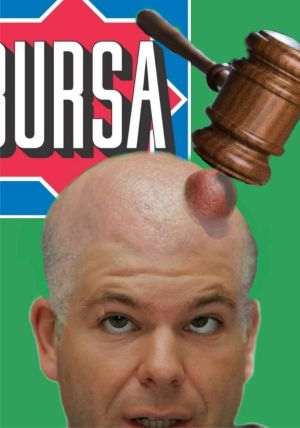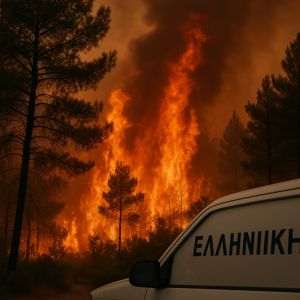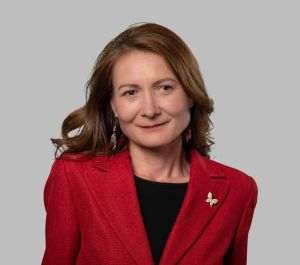The declassification of documents presented by STS, SRI, SIE and the Ministry of Interior showed us the true face of Călin Georgescu. We are talking about a surprising face, behind which both people close to the Kremlin and the mafia, underworld figures and influencers in Romania acted nonchalantly. The documents presented on Wednesday evening by the Presidential Administration show us a candidate who has accumulated obligations, which he would honor when he takes office at Cotroceni. The information received by the members of the CSAT suggests that a lot of money was spent on Călin Georgescu's electoral campaign (entrepreneur Dan Şucu valued the entire Călin Georgescu promotion campaign at 50 million euros). There is no question that it was a free electoral campaign. Moreover, the "miracle of God" that Călin Georgescu keeps boasting about, saying that "the people have awakened to their conscience," cost more money than any other candidate. Everyone was scandalized by the 2 million euros spent by the PNL for Nicolae Ciucă's 400 billboards in the "A Soldier in the Service of the Country" campaign, but no one suspected such a mobilization of funds behind Călin Georgescu. Are we talking about donations from the Romanian people who have awakened to their conscience?
You can't claim to be an independent candidate, outside the system, but depend on external and internal funding that you don't even have the common sense to declare according to electoral law. Lately, Călin Georgescu has mentioned 2-3 times that he has a campaign staff, but until now he said that the staff is his own wife, Cristela Georgescu, and the campaign headquarters is in the living room of the house in Mogoşoaia, which highlights a possible insincerity, arousing our distrust in all his metaphysical statements, such as that Jesus Christ himself speaks through his mouth.
Any statement by Călin Georgescu regarding the fact that he did not know who was sponsoring the viralization of his posts on Facebook is a lie, intended to throw a heavy, dusty curtain over reality. You can't help but wonder how your posts, which a few months ago only had hundreds or thousands of views, reached a reach of 120 million in just one month, without you paying a single leu, euro or dollar to TikTok. Any serious candidate would have asked himself such a question and would have sought to discover the mechanism that underpinned his massive promotion. Only Georgescu did not. Why?
Because he believed in God? Or because he knew his sponsors? After declaring his admiration for Corneliu Zelea Codreanu and Ion Antonescu, Călin Georgescu calmly stated that he did not promote the Legionary Movement and fascism, and then he was photographed with his advisor who is said to be the head of the neo-Legionary Movement in Romania.
This gives us proof of the honesty of Călin Georgescu, who changes his statements to their opposite from one hour to the next, depending on circumstances and interests.
• Financing of tens of millions of euros for a "great purpose"
Călin Georgescu knew about the TikTok and Facebook accounts created in 2016 and put to sleep - as the SRI and MIA documents show - until 2024, just as he knew about the financing in the last three months, since he entered the presidential race. The two state institutions are talking about accounts created in 2016. If we take into account that Georgescu met Aleksandr Dughin, one of the important ideologues of the Kremlin, just before this moment, that is, in the period 2012-2014, nothing seems impossible or inexplicable anymore. The same Dugin who has been to Romania several times, including in 2017. However, Călin Georgescu claims that he met with the Russian ideologue only twice: in Vienna, in a discussion related to the Club of Rome, and then in a context with other people, in an official setting, without specifying who those people are. In reality, it is a private meeting in 2014, in which, according to the press, he organized the reunion of several members of the Eurasia Movement in Romania with Dugin, from which we deduced that he himself is part of this movement. But Dugin's Eurasia Movement aims at nothing more, nothing less than the construction of a supranational entity in Asia and Europe that would fight against American preeminence in the world. An objective of this size probably justifies the 50 million euros invested in Călin Georgescu's campaign, the amount spent becoming minor compared to bringing Romania into Dugin's supranational entity, without firing a single shot, through simple "democratic elections".
So the scenario in which the period 2013-2016 (the year of the appearance of the TikTok accounts that were put to sleep until 2024) would have taken shape is not excluded the chain through which the Moscow man would become the president of Romania. In 2019, Călin Georgescu's rise in the presidential race would not have been possible as long as Klaus Iohannis was the favorite for a new term in Cotroceni after the battles with PSDragnea to maintain the independence of the judiciary, so the entire team behind Georgescu waited for 2024.
Călin Georgescu and the people behind him took full advantage of what Iohannis called a failed state. The entire movement regarding his presidential candidacy, everything that happened around him and the furious campaign on social media highlighted the vulnerabilities of the SRI, SIE, STS and other state institutions, as well as the flaws of the current electoral system.
The documents declassified by President Iohannis indicate a massive intervention by the Russian Federation, which used cyber tactics and disinformation campaigns to favor Georgescu's candidacy. This situation not only undermines the integrity of the electoral process, but also raises questions about the ability of Romanian institutions - SRI, SIE, STS, MAI - to protect national sovereignty. In the context in which Romania is a member of NATO and the EU, such breaches can have major geopolitical consequences, affecting the stability of the region.
• Issues related to campaign financing
Regarding the financing of the campaign, although Georgescu declared a campaign budget of "zero lei," the documents demonstrate the existence of an opaque financial network, supported by individuals such as Bogdan Peşchir and Gabriel Prodănescu, who used cryptocurrencies and other difficult-to-trace mechanisms to sponsor the campaign. The information presented at the CSAT meeting and sources cited by the media show that this involves financing of at least one million euros from Bogdan Peşchir alone, to which were added other substantial financing from some underworld figures, but also from some controversial businessmen. Dan Şucu, one of the important entrepreneurs in our country, stated that such a promotion requires at least 50 million euros and that there were days when the people behind Georgescu probably made payments of 3 million euros. Such practices not only violate electoral legislation, but also create a dangerous precedent for future elections, and moreover, highlight a systemic problem: the lack of effective mechanisms for transparency and financial control in electoral campaigns. The fact that the Permanent Electoral Authority led by Toni Greblă did not take any real measures during the 30 days of the electoral campaign regarding Călin Georgescu and intervened together with the Central Electoral Bureau only three days before the November 24 election shows that the institution in question is acting sluggishly or self-interestedly.
This slowness or inaction on the part of public institutions was exploited to the fullest by Călin Georgescu and those behind him, who intensively used the TikTok platform and exploited its algorithms to manipulate the entire electoral process. The channels România TV and Realitatea Plus also contributed greatly to this promotion, generously hosting Călin Georgescu and organizing various debates in his favor during the electoral campaign, while the candidate claims that he did not pay a single leu. It is well known that electoral advertising and promotion costs money on television, and therefore it is hard to believe that Georgescu did not spend a single penny on his promotion. Especially since other candidates, who were insignificant at the beginning of the presidential race, like him, did not benefit from the same intense promotion from the two TV channels.
Practically, from the point of view of the legality of Georgescu's campaign financing, we witnessed an unfair competition, without the state institutions taking the necessary measures and without the judges of the Constitutional Court ordering the disqualification of his candidacy, as they disqualified Diana Şoşoacă. Especially since in the case of Călin Georgescu we are talking about much more serious things.
• Declassification with "song"
But how could the judges of the Constitutional Court act in this sense, who were deprived of access to the CSAT documents until they were declassified by President Klaus Iohannis?
The CSAT meeting took place on November 28, and the next day, on November 29, at 2 p.m., the Constitutional Court was supposed to rule on the request to cancel the first round of the presidential elections.
From the evening of November 28 until noon the next day, President Klaus Iohannis did not bother to send the respective documents to the CCR so that the judges could consider them and make a decision. The President of the country preferred to witness the circus of the recount of votes validly cast in the country in the first round of the election and to let the CCR validate the results on Monday, December 2, although they had been obtained fraudulently by Călin Georgescu, through serious manipulation of voters and by violating the electoral law regarding the transparency of electoral campaign financing. Practically, based on the respective documents, the CCR could have eliminated Călin Georgescu from the race and resumed the first round of the presidential elections. However, this was not desired. It is possible that the order came from Western chancelleries so that the state of political uncertainty, of chaos, would no longer continue in Romania, given the conflict in Ukraine and the permanent, hybrid aggression coming from the Russian Federation.
Another aspect should be noted regarding the declassification of the documents by President Klaus Iohannis. The information prepared by the Special Telecommunications Service was unclassified and had been known since the evening of the CSAT meeting, which took place on November 28. The information from the SRI and the Ministry of Interior is the most documented, presenting the mode of action and the entire network that was behind Călin Georgescu's campaign. Moreover, the MIA information talks about influencers from Moscow, but also about Eugen Sechila, a former member of the Foreign Legion, with the officials of the Ministry of Interior stating that he organized several paramilitary camps in our country. Antena 3 stated that Sechila is close to Horaţiu Potra, another member of the Foreign Legion, a controversial person who had criminal problems and was even sentenced to prison in the past.
From the declassification of the information received by President Iohannis at the CSAT meeting on November 28, we also note that the document drawn up by the Foreign Intelligence Service does not provide us with any concrete information, it does not show any scheme, any network, anything. Gabriel Vlase, the former social-democrat senator appointed by Parliament to head the SIE, presented himself with a two-and-a-half-page document, without any concrete information, unlike those from the SRI and the MIA. What follows from this? That either the SIE officers on the relationship with Russia are stupid or are double agents, in which case they should be fired immediately, or, if they are neither stupid nor double agents, someone from the SIE is trying to hide something related to Călin Georgescu from us. More precisely, that he is the man of the system, created with the system's approval, since the other documents show that all the accounts now activated on TikTok for Georgescu were set up since 2016, that is, 8 years ago. So what did the SIE do for 8 years?
• Conclusion
The main loss that we record as a result of this unprecedented event in the Romanian elections consists in the fact that our civic sensitivity was lured by virtue of our aspirations for dignity, for honor, for regaining national identity, for the pride of being part of the Romanian nation, all paraded by a deceitful man and who gave signs of an imposture that could not be detected by the great mass of our compatriots.
On the other hand, regardless of whether he will have speculated on this sensitivity/vulnerability in Romania of the psychology of the masses, it should give food for thought to the political class that this aspiration exists and that it must be treated seriously. The horrible situation in which we have come to reject all the candidates proposed by the political parties (except Elena Lasconi) and prefer a deceptive individual waving the banner of Christianity, luring us with honorability and elegance, proves the generalized disappointment regarding the lack of morality and spirit of our political class.
• General Prosecutor's Office: Criminal investigation file for money laundering and other electoral crimes
The Prosecutor's Office attached to the High Court of Cassation and Justice (General Prosecutor's Office) announced, yesterday, December 5, 2024, that it has been notified ex officio regarding possible electoral crimes and other related facts. The decision comes following the analysis of declassified documents presented during the meeting of the Supreme Council for National Defense (CSAT) of November 28, 2024, regarding the electoral process for the position of President of Romania.
According to the official press release issued by the General Prosecutor's Office, the investigation is aimed at indications regarding the influence of the voting process through methods such as voter corruption, including through actions carried out online, with the aim of favoring a particular candidate. There are also suspicions of money laundering, related to the use of funds of illegal origin to finance the electoral campaign. Another aspect of the investigation concerns cybercrimes, including the creation and use of fake accounts in the online environment, actions that could have influenced the elections and the correct expression of votes.
The Prosecutor General's Office requested the Chief Prosecutor of DIICOT to analyze the situation from the perspective of crimes that fall within the competence of the specialized structure, according to the legal provisions of GEO no. 78/2016.
The investigation is in a preliminary phase, and the authorities promise to publicly communicate the relevant developments in this case.











































